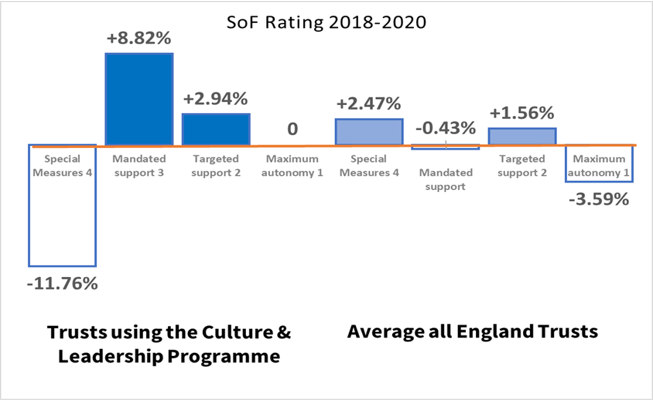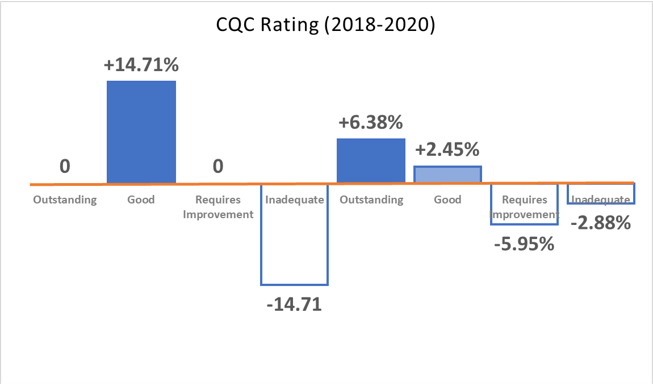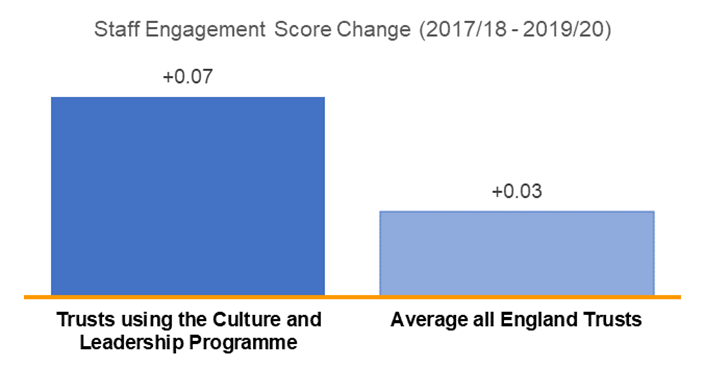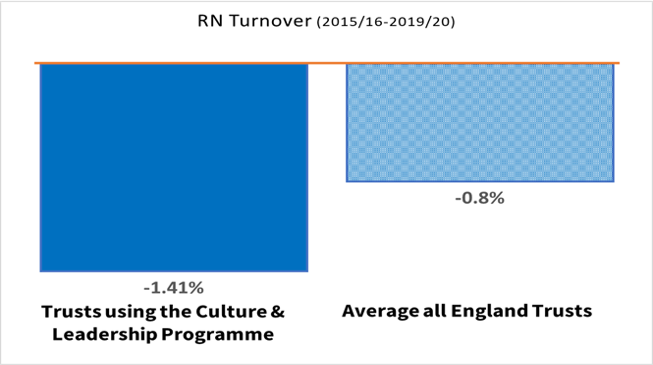Culture Transformation Team, NHS England, in partnership with AffinaOD.
The challenge
“…it is the overall culture –“the way we do things in the NHS” – which will define what the NHS means and does…A positive culture as described does not just emerge through the good intentions of those working in the system. It needs to be defined, accepted by those who are to be part of it, and continually reinforced by leadership, training, personal engagement and commitment.” Mid Staffordshire NHS Foundation Trust Public Inquiry (2013).
The Culture and Leadership Program was developed 2015-2021.
NHS Improvement, The Kings Fund and the Centre for Creative Leadership developed a programme to support trusts’ culture change journeys:
- Co-designed and piloted with three trusts: Central Manchester University Hospital NHS Foundation Trust; East London NHS Foundation Trust; Northumbria Healthcare NHS Foundation Trust.
- Deployed in at least 80 Trusts to date.
The evidence, from research and practice, confirms that leadership, particularly compassionate and inclusive leadership, is key to culture change and results in:
- high quality care and value for money (Developing collective leadership for health care, The Kings Fund, 2014)
- a healthy and engaged workforce (West and Dawson, March 2017)
- a greater sense of belonging for all staff, reducing discrimination, bullying and unfairness (https://www.nhsemployers.org/case-studies/listening-voices-staff-disabilities;
- better leadership, psychological safety and staff feeling able to speak up and to continuously improve care (The Kings Fund 2014).
“Compassionate and inclusive working environments also positively impact staff engagement; an increase of 0.12 in staff engagement scores within the NHS staff survey correlate with a 0.9% decrease in agency spending, saving £1.7million for the average trust.” Employee engagement, sickness absence and agency spend in NHS trusts, NHS England Report, Dawson and West, March 2017.
Culture and Leadership Programme (CLP): Impact and outcomes for high quality care
Quantitative analysis of data from all 35 CLP trusts examined between 2018 and 2020 against national averages showed improvements in all indicators below.
CQC ratings (2018 – 2020)
Image text:
- Outstanding: 0
- Good: +17.71%
- Requires improvement: 0
- Inadequate: -14.71%
- Outstanding: +6.38%
- Good: +2.45%
- Requires improvement: -5.95%
- Inadequate: -2.88%
Single oversight framework (2018 – 2020)

Image text:
- Special measure 4: -11.76%
- Mandated support 3: +8.82%
- Targeted support 2: +2.94%
- Maximum autonomy 1: 0
- Special measure 4: +2.47%
- Mandated support 3: -0.43%
- Targeted support 2: +1.56%
- Maximum autonomy 1: -3.59%
Staff engagement (2017/18 – 2019/20)
Image text:
- Trust using the culture and leadership programme: -0.07%
- Average all Engand trusts: +0.8%
Retention: Registered nurse turnover (2015/16 – 2019/20)
Image text:
- Trust using the culture and leadership programme: -1.41%
- Average all Engand trusts: -0.8%
Source report: “An evaluation of the implementation of the NHS Culture and Leadership Programme “ December 2021. Dr Thomas West (Affina Organisational Development/Bristol University), Professor Michael West (King’s Fund/Lancaster University). Commissioned by Dr Katy Steward (Head of Culture Transformation NHS England).
Enabling leadership factors for sustainable compassionate and inclusive cultures
The report identified themes of enablers and barriers to the success of the CLP programme.
Leaders who manage culture in their trust also:
- Are supported by the board support and have high levels of board engagement
- Have stable, mature boards with high levels of team functioning
- Pay attention to the recruitment and functioning of the change team
- Organisation development capacity for the change team
- The use of the tools, their face validity and the robust evidence base
- NHS England modelling trust and support in relationships with organisations.
- Focus on equality, diversity, and inclusion in culture
- Maintain momentum.
Sustainable change – takes time
“I realised that its value is not just in the out comes, but in the journey itself. If you want to see profound cultural change, you have to take the time to gather people’s experiences. That’s how you find out what’s actually happening in the organisation..” Alfredo Thompson, Programme Director, North Middlesex University Hospital NHS Trust.
Strategy development
“After embedding the programme into the trust our Staff Survey Results for 2018 showed year on year improvement, 18 of key indicators were above average. The CQC results showed ‘good’ with areas of outstanding practice (2017). Our Sickness absence was below national average for MH trusts, employee relations cases reduced by 75% in 12 months. The staff engagement score was above average. This helped us to develop a strategy to continue to improve and to measure impact going forwards”
Programme Lead, Lincolnshire Partnership NHS Trust.
Board support
“We have seen statistically significant improvements in our NHS Staff Survey 2020 performance including a record 60% response rate. This includes improvements in creating a safe environment by tackling bullying and harassment, staff recommending the organisation as a place to work, higher levels of staff engagement, and positive action on health and wellbeing. We’re not out of the woods, as we’re overdue a CQC inspection, so we’re still a ‘requires improvement’ trust –but I know the data is showing us to be a good trust” Maggie Oldham, CEO, Isle of Wight NHS Foundation Trust.




